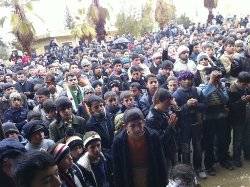Fears are growing that parts of the Syrian city of Homs is on the verge of a humanitarian catastrophe, with activists saying the lack of food and water is almost as great a threat as the violence.
Heavy shelling was reported in the city's Bab Amr neighborhood for an 18th day on Tuesday. Activists said dozens of people were killed.
Hadi al-Abdallah, an activist in Homs, described the humanitarian situation as "catastrophic".
"Water has been cut off from Bab Amr for 18 days," he told Al Jazeera. "There's no electricity, cooking oil or even bread. Many people are literally on the brink of starvation.
"People have fled their homes in fear of being bombed. They took refuge in a mosque, and there they were bombed too."
Shortage of medicine
The Homs Revolutionary Council reported a shortage of medicine, and said a large number of killed civilians were buried under the rubble of buildings damaged in the shelling.
In the nearby Inshaat neighborhood, the council said security forces, supported by the army and by armored vehicles, had carried out house raids and arrests.
Bab Amr is a stronghold of the armed opposition, but activists say most of those killed in the assault on the area are civilians.
The Local Co-ordination Committees says about 3,000 people have been killed in Homs province since the uprising began in March last year. The activist network says more than 8,000 people have been killed nationwide.
US warns of 'additional measures'
Meanwhile, US officials signaled that arming Syrian opposition fighters could be an option if a political solution to the crisis cannot be reached.
"We still believe that a political solution is what's needed in Syria," said Jay Carney, the White House spokesman.
"We don't want to take actions that would contribute to the further militarization of Syria, because that could take the country down a dangerous path. But we don't rule out additional measures."
Asked if the US was shifting its stance on arming the fighters, Victoria Nuland, spokeswoman for the US state department, said Washington did not want to see the violence increase and was concentrating on political efforts to halt the bloodshed.
"That said ... if we can't get Assad to yield to the pressure that we are all bringing to bear, we may have to consider additional measures," she said, declining to elaborate.
Hillary Clinton, the US secretary of state, will attend talks on Syria in Tunisia on Friday and Saturday at a meeting of the "Friends of Syria" group.
Russia, a longtime supporter of president Bashar al-Assad, has said it will not take part in the Tunis talks. China, which joined Russia in vetoing UN Security Council resolutions on Syria, has not announced whether it will participate.
PHOTO CAPTION
Demonstrators protest against Syria's President Bashar al-Assad in Jerjenaz, near Idlib, February 17, 2012.
Al-Jazeera


 Home
Home Discover Islam
Discover Islam Quran Recitations
Quran Recitations Lectures
Lectures
 Fatwa
Fatwa Articles
Articles Fiqh
Fiqh E-Books
E-Books Boys & Girls
Boys & Girls  Women
Women










